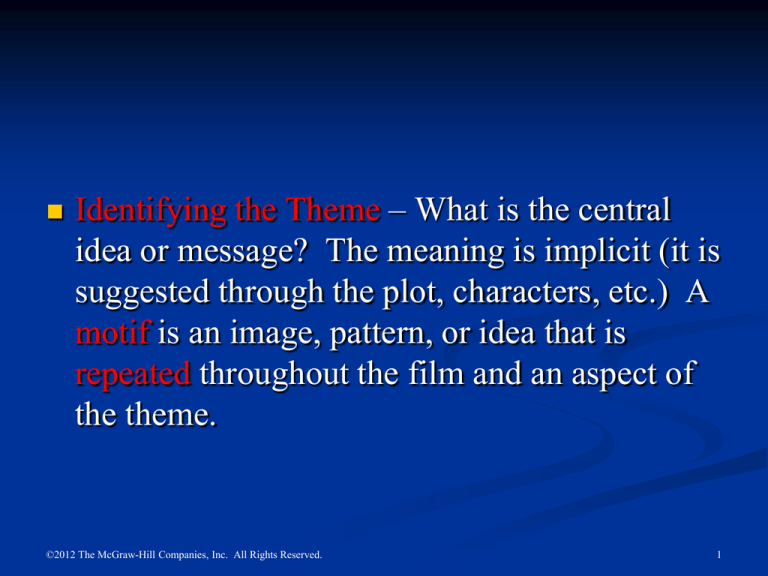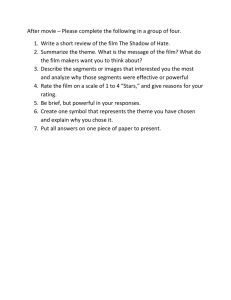
Identifying the Theme – What is the central
idea or message? The meaning is implicit (it is
suggested through the plot, characters, etc.) A
motif is an image, pattern, or idea that is
repeated throughout the film and an aspect of
the theme.
©2012 The McGraw-Hill Companies, Inc. All Rights Reserved.
1
2
Thematic Elements
Theme and Focus
Focus on Plot – what happens is more important
than characters, emotions, ideas, etc. Detective
and adventure stories do this.
Focus on Emotional Effect or Mood – a single
mood or emotion is of most importance. Suspense,
horror, and romance movies often do this.
©2012 The McGraw-Hill Companies, Inc. All Rights Reserved.
2
2 Thematic Elements
Focus on Character- certain qualities set the
character apart from others & the unique character
is what is of principal concern in the film.
Focus on Style or Texture or Structure – The story
is told in a unique or unusual way (look, rhythm,
tone, atmosphere, organization) & this eclipses the
other elements of the film.
©2012 The McGraw-Hill Companies, Inc. All Rights Reserved.
3
Focus on Ideas – serious films that clarify an aspect
of life or the human condition.
1. Moral implications – persuade the audience to
accept a moral principle.
2. Truth of human nature – universal characteristics
about human nature
3. Social problems – vices, follies, or institutions are
criticized
©2012 The McGraw-Hill Companies, Inc. All Rights Reserved.
4
Focus on Ideas
4. The struggle for human dignity – conflict
between opposing sides of human nature
(animal instincts, cowardice, brutality,
stupidity, sensuality vs. courage, sensitivity,
intelligence, spirituality, individualism).
These characters are often placed at a
disadvantage.
The conflict could be external (against an
institution etc.) or internal (his personality).
©2012 The McGraw-Hill Companies, Inc. All Rights Reserved.
5
Focus on Ideas
5. Complex human relationships – love,
friendship, divorce, family relationships, etc.
6. Coming of age / loss of innocence – a
dynamic character must step into maturity
7. Moral / philosophical riddle – ambiguous
symbols, images, etc. lead to diverse
subjective interpretations
©2012 The McGraw-Hill Companies, Inc. All Rights Reserved.
6
Evaluating the Theme – Access the message of
the film. Why is it a “good” or an “important”
message.
Universality – has lasting interest beyond the here
and now (for example heroic struggles for human
dignity or the underdog story).
©2012 The McGraw-Hill Companies, Inc. All Rights Reserved.
7
Questions for Analyzing Theme:
On Theme and Focus
What is the film’s primary focus: plot, emotional
effect or mood, character, style or texture or structure,
or ideas? On the basis of your decision, answer one of
these questions:
If the film’s primary concern is plot, summarize the action
abstractly in a single sentence or a short paragraph.
If the film is structured around a mood or emotional effect,
describe the mood or feeling that it attempts to convey.
If the film’s focus is on a single unique character, describe
the unusual aspects of his or her personality.
©2012 The McGraw-Hill Companies, Inc. All Rights Reserved.
8
Questions for Analyzing Theme:
On Theme and Focus
If the film seems to be built upon a unique style or texture
or structure, describe the qualities that contribute to the
special look or feel of the film.
If the film’s primary focus is an idea, answer these
questions:
What is the true subject of the film? What is it really about in
abstract terms? Identify the abstract subject in a single word or
phrase.
What statement does the film make about the subject? If possible,
formulate a sentence that accurately summarizes the idea
dramatized by the film.
©2012 The McGraw-Hill Companies, Inc. All Rights Reserved.
9
Questions for Analyzing Theme:
On Identifying the Theme
Although a director may attempt to do several things
with a film, one goal usually stands out as most
important. Decide which of the following was the
director’s primary aim, and give reasons for your
choice.
Providing pure entertainment—that is, temporary escape
from the real world
Developing a pervasive mood or creating a single,
specialized emotional effect
Providing a character sketch of a unique, fascinating
personality
©2012 The McGraw-Hill Companies, Inc. All Rights Reserved.
10
Questions for Analyzing Theme:
On Identifying the Theme
Creating a consistent, unique feel or texture by weaving
all of the complex elements of film together into a
one-of-a-kind film experience
Criticizing society and social institutions and increasing
the viewer’s awareness of a social problem and the need
for reform
Providing insights into human nature (demonstrating what
human beings in general are like)
Creating a moral or philosophical riddle for the viewer
to ponder
Making a moral implication to influence the viewer’s
values or behavior
©2012 The McGraw-Hill Companies, Inc. All Rights Reserved.
11
Questions for Analyzing Theme:
On Identifying the Theme
Dramatizing one or more characters’ struggle for human
dignity against tremendous odds
Exploring the complex problems and pleasures of human
relationships
Providing insight into a growth experience, the special
kinds of situations or conflicts that cause important changes
in the character or characters involved
Which of the items listed in the previous question
seem important enough to qualify as secondary aims?
©2012 The McGraw-Hill Companies, Inc. All Rights Reserved.
12
Questions for Analyzing Theme:
On Evaluating the Theme
Is the film’s basic appeal to the intellect, to the funny
bone, to the moral sense, or to the aesthetic sense? Is
it aimed primarily at the groin (the erotic sense), the
viscera (blood and guts), the heart, the yellow streak
down the back, or simply the eyes? Support your
choice with specific examples from the film.
How well does your statement of the film’s theme
and focus stand up after you have thoroughly
analyzed all elements of the film?
©2012 The McGraw-Hill Companies, Inc. All Rights Reserved.
13
Questions for Analyzing Theme:
On Evaluating the Theme
To what degree is the film’s theme universal? Is the
theme relevant to your own experience? How?
If you think the film makes a significant statement,
why is it significant?
Decide whether the film’s theme is intellectually or
philosophically interesting, or self-evident and
boring, and defend your decision.
Does the film have the potential to become a classic?
Will people still be watching it twenty years from
today? Why?
©2012 The McGraw-Hill Companies, Inc. All Rights Reserved.
14
©2012 The McGraw-Hill Companies, Inc. All Rights Reserved.
15
©2012 The McGraw-Hill Companies, Inc. All Rights Reserved.
16
©2012 The McGraw-Hill Companies, Inc. All Rights Reserved.
17
©2012 The McGraw-Hill Companies, Inc. All Rights Reserved.
18
©2012 The McGraw-Hill Companies, Inc. All Rights Reserved.
19
©2012 The McGraw-Hill Companies, Inc. All Rights Reserved.
20
©2012 The McGraw-Hill Companies, Inc. All Rights Reserved.
21
©2012 The McGraw-Hill Companies, Inc. All Rights Reserved.
22
©2012 The McGraw-Hill Companies, Inc. All Rights Reserved.
23
©2012 The McGraw-Hill Companies, Inc. All Rights Reserved.
24
©2012 The McGraw-Hill Companies, Inc. All Rights Reserved.
25
©2012 The McGraw-Hill Companies, Inc. All Rights Reserved.
26
©2012 The McGraw-Hill Companies, Inc. All Rights Reserved.
27
©2012 The McGraw-Hill Companies, Inc. All Rights Reserved.
28
©2012 The McGraw-Hill Companies, Inc. All Rights Reserved.
29




